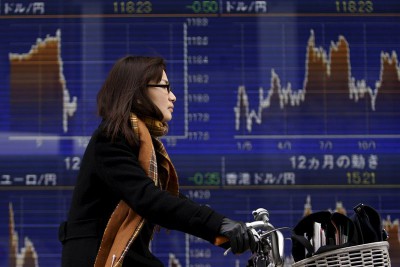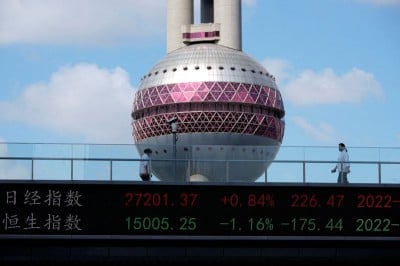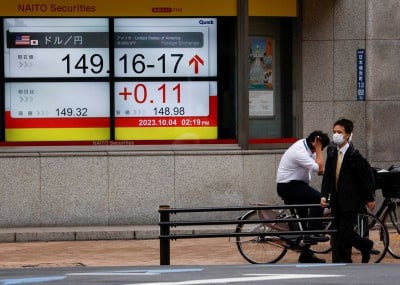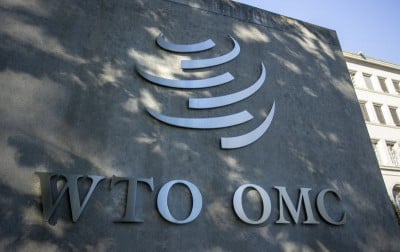 © Reuters. USD/JPY -0.01% Add to/Remove from Watchlist Add to Watchlist Add Position
© Reuters. USD/JPY -0.01% Add to/Remove from Watchlist Add to Watchlist Add Position Position added successfully to:
+ Add another position Close AXJO -0.90% Add to/Remove from Watchlist Add to Watchlist Add Position
Position added successfully to:
+ Add another position Close JP225 -1.28% Add to/Remove from Watchlist Add to Watchlist Add Position
Position added successfully to:
+ Add another position Close HK50 -1.81% Add to/Remove from Watchlist Add to Watchlist Add Position
Position added successfully to:
+ Add another position Close NSEI +0.27% Add to/Remove from Watchlist Add to Watchlist Add Position
Position added successfully to:
+ Add another position Close KS11 -0.31% Add to/Remove from Watchlist Add to Watchlist Add Position
Position added successfully to:
+ Add another position Close SSEC -0.69% Add to/Remove from Watchlist Add to Watchlist Add Position
Position added successfully to:
+ Add another position Close CSI300 -0.80% Add to/Remove from Watchlist Add to Watchlist Add Position
Position added successfully to:
+ Add another position Close
Investing.com-- Most Asian stocks fell on Tuesday, seeing some profit taking after rallying sharply through November on expectations of a less hawkish Federal Reserve, while a string of weak economic readings from across the region also dented sentiment.
Japan’s Nikkei 225 fell 1.4%, leading losses across Asia as recent strength in the yen dented export-heavy stocks. Purchasing managers index data showed that Japan’s service sector grew less than expected in November, indicating that local demand may be cooling amid slowing economic growth.
Inflation in Japan’s capital fell more than expected in November and came closer to the Bank of Japan’s 2% annual target, further pointing to signs of a consumer spending slowdown. But cooling inflation gives the BOJ less impetus to begin tightening policy in 2024- a scenario which is positive for Japanese stocks.
Australia’s ASX 200 fell 0.9% after data showed the country logging an unexpected current account deficit in the September quarter. The deficit came chiefly from a drop in exports, as demand in China- Australia’s biggest trading partner- remained weak.
Focus was also on a Reserve Bank of Australia meeting later in the day, where the central bank is widely expected to keep interest rates on hold at 4.35%. But the bank may reiterate its warning on overheated inflation in the country, following a string of warnings from Governor Michele Bullock.
Broader Asian markets fell, taking a weak lead-in from Wall Street indexes as a recent rally cooled. While markets still maintained expectations that the Fed was done raising interest rates, some uncertainty over the bank’s plans for rate cuts in 2024 saw investors pause.
Caution also persisted before key nonfarm payrolls data due this Friday, which is expected to shed more light on the labor market. Still, broader Asian markets were nursing strong gains for November, as weak U.S. inflation and labor data fueled bets on a less hawkish Fed in 2024.
South Korea’s KOSPI fell 0.4% as data showed consumer price index inflation grew less than expected in November, while economic growth remained muted in the third quarter.
Futures for India’s Nifty 50 index pointed to a weak open, with local stocks set for some profit taking after closing at record highs on Monday. Monday’s rally was driven chiefly by optimism over India’s ruling BJP party clocking victories in three crucial state elections, which set up the BJP for a strong showing in the 2024 general election.
Chinese stocks sink as positive PMI offers little relief
China’s Shanghai Shenzhen CSI 300 and Shanghai Composite indexes fell 0.6% each, while Hong Kong’s Hang Seng shed 1.1%, pressured chiefly by mainland stocks.
Markets largely brushed off a private purchasing managers index survey showing bigger-than-expected growth in China’s services sector, given that the reading still showed growth well below pre-COVID levels.
Sentiment towards China was also battered by growing concerns over a new epidemic in the country, following a surge in respiratory illnesses across major cities. The National Health Commission, which was at the heart of the country’s three year long COVID-19 crackdown, reportedly suggested curbs on public gatherings in light of the recent outbreak.
Asian stocks sink as rate cut rally cools, weak economic data weighs








